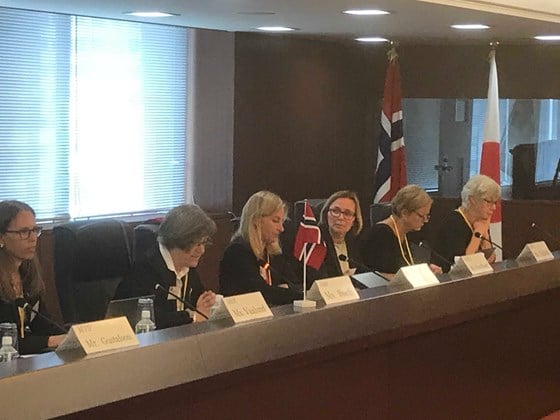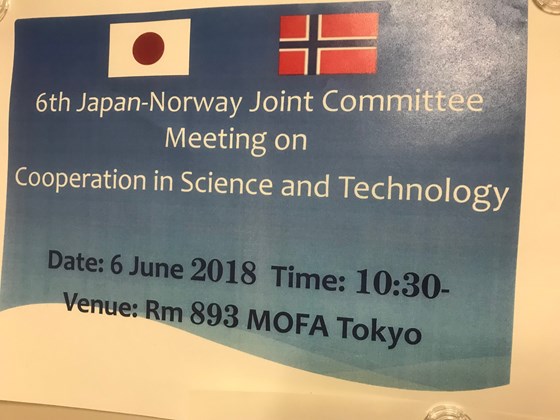Norway and Japan expand scientific and technological cooperation
Historical archive
Published under: Solberg's Government
Publisher: Ministry of Education and Research
News story | Date: 07/06/2018
On June 6th 2018 the 6th Japan-Norway Joint Committee Meeting on cooperation in science and technology was held in Tokyo. The Joint Committee Meeting brought together representatives from several ministries, government agencies and research institutions in both countries to review the cooperation in the existing prioritized areas of cooperation.
The cooperation in energy and the environment is substantial, involving a large number of institutions and companies within several disciplines from both countries. The 2015 Japan-Norway Energy Science Week explored new possibilities, business opportunities and solutions within environmental friendly energy, with broad participation from the research community and also energy related businesses from both countries, with sessions on off-shore wind, hydrogen/fuel cells, smart energy system, smart cities, buildings and industry, social science research and CO2 capture and storage (CCS). Cooperation within hydrogen has been further developed through a seminar organized at the Norwegian Embassy in Tokyo, focusing on the whole value chain for environmental-friendly production of hydrogen and distribution of hydrogen over long distances as well as a meeting at the Norwegian Embassy in Tokyo in 2018 in connection with the 14th International Hydrogen and Fuel Cell Expo in Tokyo.
Cooperation in polar and space research is increasing, with activities in a number of areas including satellite earth observations, space physics and climate change research both in the Arctic and the Antarctic. Among the research topics are sea ice development, black carbon developments and weather and climate dynamics, in addition to sounding rocket missions, through the multi rocket program GCI CUSP. The 2016 Japan-Norway Arctic Science and Innovation Week proved to be a successful arena for strengthening already existing relationships and for establishing cooperation between new partners. Mobility of scientists as well as sharing of research infrastructure are important elements in developing the cooperation in polar and space research further.
The cooperation in nanotechnology and new materials involves both researcher exchanges between research institutions and also project cooperation, including both academic and industry partners.

The 5th Japan-Norway Joint Committee Meeting, which was held in Oslo in 2015, expanded the prioritized area “seafood safety” to “marine research”. This is a natural development due to the two countries' roles in ocean research involving both natural sciences, technology and social science. The need to develop marine resources and conduct economic activities in the oceans in a sustainable way, has been the basis for new collaborative initiatives involving exchanges of young researchers and cooperation within both academia and industry. A good example is the cooperation project Aqua Excel, which is an a exchange programme between the University of Bergen and other Norwegian institutions in Bergen with several Japanese universities, among these the University of Tokyo, University of Hokkaido, Nagoya University and Japan Fisheries Research and Education Agency. The programme has a thematic focus on marine aquaculture. There is also excellent cooperation between the Norwegian Institute of Marine Research (IMR) and research Institutions in Japan in such fields as oceanography and climate (JAMSTEC), aquaculture (Tokyo University of Marine Science and Technology), sea mammals (Institute of Cetecean Research), and seafood safety and quality (University of Tokyo and National Institute of Minamata Disease).
The academic cooperation has also been strengthened through the funding of 7 projects supported by the Research Council of Norway's International Partnership Program (INTPART). The programme promotes the development of long-term relations between Norwegian higher education and research institutions and high-quality academic environments/research groups in the Government's eight priority countries for cooperation outside Europe, which includes Japan.
The Joint Committee Meeting acknowledged that Japan and Norway share both challenges and policy goals related to an ageing population and maintaining sustainable health and care services, and that research cooperation between Japanese and Norwegian research institutions related to health, care and welfare technology is already substantial. The delegations agreed to include "Health, care and welfare technology" as a new prioritized area for cooperation under the agreement. To allow for further discussions on how both countries can benefit from stronger cooperation within health research and innovation , and on future priorities and steps to increase cooperation in these fields, the Research Council of Norway and the Norwegian Embassy in Tokyo organized a roundtable meeting for relevant ministries, agencies and institutions on June 7th.
